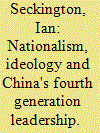| Srl | Item |
| 1 |
ID:
127574


|
|
|
|
|
| Publication |
2012.
|
| Summary/Abstract |
When the fourth generation of leaders came to power in China, the country began drawing up its policy in Central Asia (CA) on the concept of peripheral diplomacy, which since 2005 has been based not on the thesis of "China's peaceful rise," but on the theory of "peaceful development" that came to replace it, as well as on the idea proposed by Hu Jintao of "working together to build a harmonious world." At present, China's relations with the regional states are being established in keeping with the concept of "friendly, peaceful, and prosperous neighbors" (mulin, anlin, fulin) confirmed at the 17th congress of the CPC. As Fudan University Professor Zhao Huasheng, a leading Chinese specialist on CA, emphasized, this concept, which was formulated as early as 2003, reflects the new approaches to relations with neighboring countries.
|
|
|
|
|
|
|
|
|
|
|
|
|
|
|
|
| 2 |
ID:
093997


|
|
|
| 3 |
ID:
139007


|
|
|
|
|
| Summary/Abstract |
A burgeoning interest among academics, policy-makers and civil society groups has developed concerning Africa's extractive sector and particularly its mining codes, which are now at the centre of a wider policy debate over natural resource governance and economic development on the continent. This article reviews the evolution of Africa's regulatory codes in the mining sector, which has undergone what Bonnie Campbell describes as ‘three generations’ of liberalization since the 1980s. We also highlight new voluntary, regional and transnational initiatives, driven by a host of heterogeneous actors from Africa and abroad, which constitute a ‘fourth’ generation of mining codes and natural resource governance practices that place primary emphasis on transparency and accountability by both mining companies and host governments. This new generation of natural resource governance initiatives presents new opportunities as well as unique challenges, particularly with the growing role of emerging economies such as the BRICS (Brazil, Russia, India, China and South Africa). We conclude by assessing future trends and policy challenges in Africa's extractive sector governance.
|
|
|
|
|
|
|
|
|
|
|
|
|
|
|
|
| 4 |
ID:
059602


|
|
|